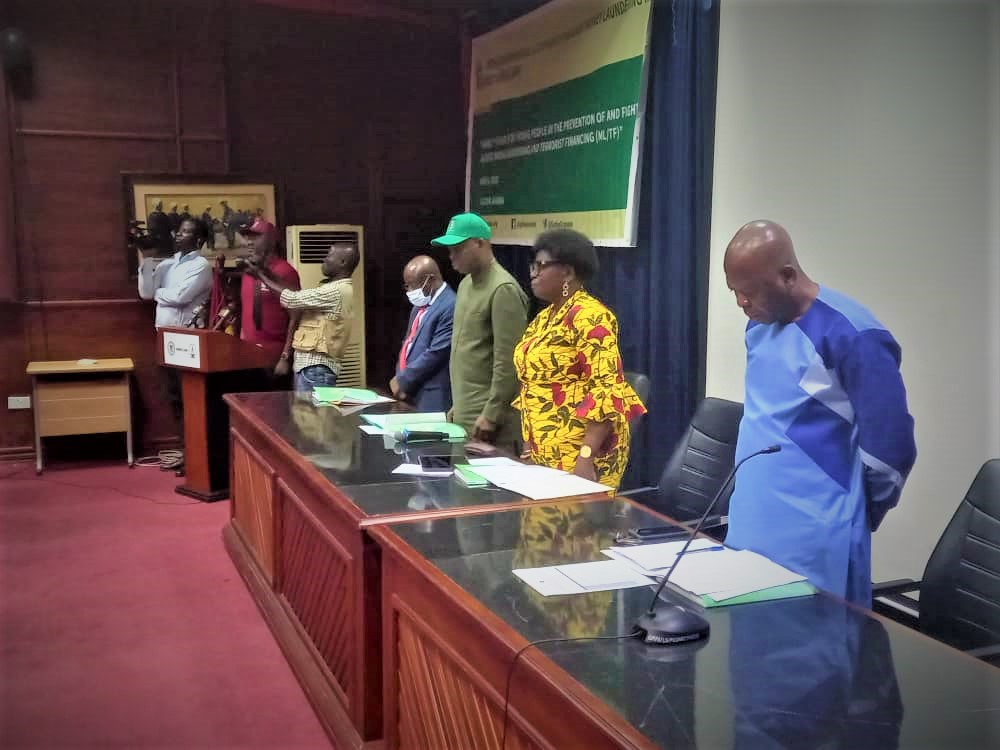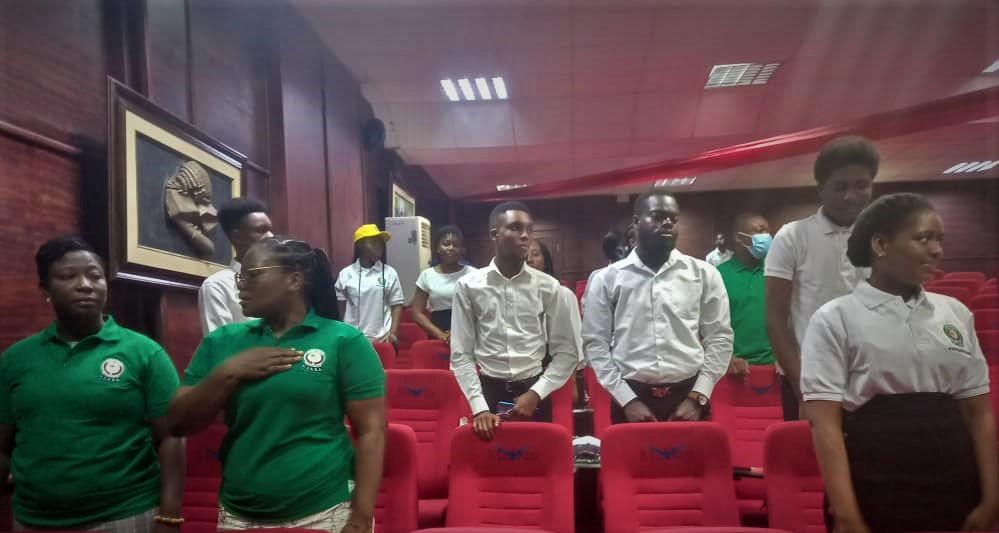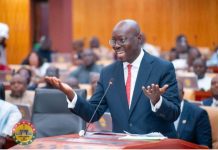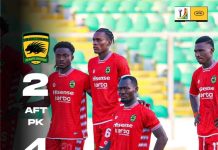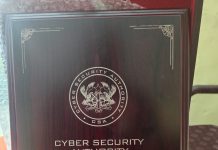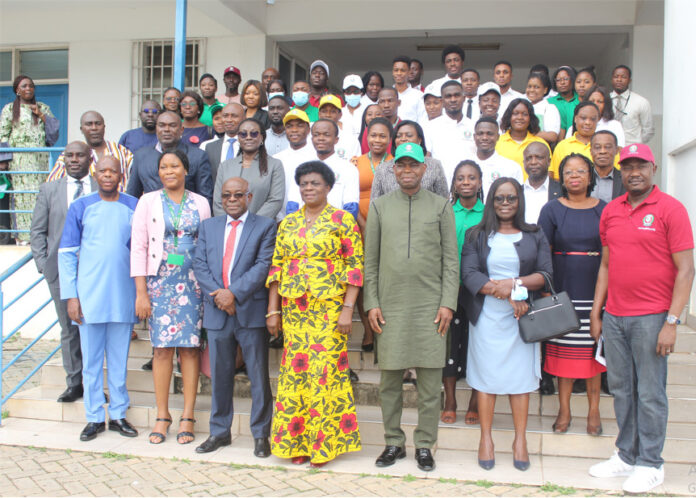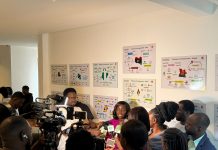The Inter-Governmental Action Group against Money Laundering in West Africa (GIABA) held the 13th Open House Forum on Anti Money Laundering and Countering the Financing of Terrorism (AML/CFT) for Youths at the Ghana Institute of Management and Public Administration (GIMPA), Accra, Ghana, on Monday, May 9th, 2022.
The objective of the Open House Forum was to garner the youth’s support against organized crime, including money laundering (ML) and terrorist financing (TF), by targeting their attitudes, behaviours, and beliefs.
At the end of the day, it is expected that the participants will understand the harmful effects of these evils on the rule of law, political stability, democracy, economic development, prosperity, and health of the citizens of West Africa in particular.
In its efforts to involve all stakeholders in the fight against ML/TF in West Africa, GIABA has been organizing the Open House Fora for youths since 2007.
It would be recalled that the city of Accra hosted the first-ever Open House Forum way back in 2009.
About one hundred youths mainly youths from universities and institutions of higher learning, sports and cultural associations, youth groups, and religious associations participated in the 13th Edition.
The event was on the theme “The Role of Young People in the Prevention of and Fight against Money Laundering and Terrorist Financing (ML/TF).”
Other secondary beneficiaries will include representatives of civil society organisations and associations, banks, insurance companies, media houses, the diplomatic corps, etc.
Organised crime has become a major threat to development and security in the region. Protecting the youths and guaranteeing them a future in an economically prosperous region have thus become priorities for ECOWAS in the wake of regional integration.
Developing the capacity of the youth and empowering them for future leadership would require concerted efforts at both national and individual levels.
These youths therefore need to be educated and sensitized to the essence of combating organized crime in all its forms and ramifications.
The outcomes of the previous editions revealed a huge gap, in terms of capacity, among the various strata in the society on issues relating to AML/CFT, hence the need to improve on capacity building for youths in member States, to enhance their understanding of AML/CFT regimes, thereby positioning them as champions of good governance.
The Open House Forum is one of the awareness and advocacy strategies adopted by GIABA to sensitize stakeholders from ECOWAS member States particularly the youths on the threats of money laundering, financing of terrorism and other crimes to enable them advocate for strong AML/CFT measures in the region.
The menace of transnational organised crime in particular, money laundering and terrorist financing, pose serious threats to peace, security and sustainable development in any nation.
Addressing the gathering, the Director-General of GIABA, Justice Kimelabalou ABA, in a speech read on his behalf by Dr. Buno Nduka, Director of Evaluation and Compliance of GIABA, said the essence of this forum is to introduce GIABA and what its mandates to the teeming youths of this nation.
He said Money laundering and terrorist financing severely undermine sustainable development by eroding social and human capital, threatening social and political stability, causing an artificial rise in the cost of business, and driving away investment.
“This undercuts the ability of member States to initiate or accelerate development. The proceeds of crime fuel corruption, which in turn facilitates the commission of crimes and undermines the rule of law. The result of inadequate rule of law is a sense of general insecurity, which renders the state incapable of attracting enough foreign direct investment.
Government can no longer guarantee the safety of its financial system. Over the past several years, political upheavals due to resource control or simple greed have left many parts of the region in total chaos, with resources for reconstruction inadequate or simply unavailable.”
He continued….”Meanwhile, the criminal justice systems, including law enforcement and the overall administration of justice, remain too weak, lacking capable human and material resources to make any meaningful or lasting difference.
It is in recognition of the deleterious impact of these phenomena that GIABA, in its efforts to ensure the involvement of all stakeholders in the fight against money laundering and terrorist financing in West Africa held an Open House Forum in 2009 aimed to sensitize the youths and civil society to their responsibilities and obligations under the Anti-Money Laundering and Counter-Financing of Terrorism (AML/CFT) regime towards fostering and strengthening partnership between GIABA and the youth in the fight against transnational organized crimes in particular money laundering and terrorist financing in the region.
Additionally, we use this forum to invite all sections of the society, youths and students, the media and the civil society, religious and traditional leaders to join us in our campaign against money laundering and terrorist financing.”
He commended the Ghanaian authorities, especially our line ministries, namely Ministries of Justice, Finance, and Interior, as well as our National Correspondent for the continued support and cooperation they have accorded us towards the organization of this event.
He added that GIABA had assembled a team of highly skilled facilitators to treat different topics that will enhance the understanding of the theme and encourage the youth to carry out their active roles in ensuring that we have a peaceful and prosperous nation.
“Money Laundering (ML) and the Financing of Terrorism (FT) are not new phenomena in West Africa. Typologies have already identified a vast number of Money Laundering cases in the region; cases of terrorist financing are also now beginning to be identified in several countries. These cases are obviously intimately linked to corruption. This is the reason why States in West Africa have a duty to act together to combat these threats.
This must be done not only as part of protecting the world economies, including Africa’s, against criminal infiltration, but also to enhance the rule of law, deepen regional integration and maintain regional peace and security. The ECOWAS states are under serious threat of social dislocation or worse unless action is taken now. It is also pointedly within GIABA’s specific mandate to “facilitate the adoption and implementation by member States of measures against ML and FT, taking into account specific regional peculiarities and conditions”.”
Touching on the mandate of GIABA, he highlighted amongst others the role of GIABA to participants to fully understand and appreciate the mandate, functions and roles of their community institution.
“The Inter-Governmental Action Group against Money Laundering in West Africa (GIABA) is a specialized institution of the Economic Community of West African State (ECOWAS), as well as Financial Action Task Force (FATF) – Style Regional Body (FSRB). It was formally established in December 2000 by the Authority of Heads of State and Government of ECOWAS.
The establishment of GIABA is one of the main responses and contributions of ECOWAS towards the prevention and fight against international money laundering and terrorist financing in this region.
The objectives of GIABA include to:
1. Adopt and diligently implement standards against money laundering and terrorist financing in accordance with acceptable international standards and practices, including the FATF 40 Recommendations;
2. Facilitate the adoption and implementation by member States of measures against money laundering and terrorist financing taking into account the specific particularities and conditions in the region;
3. Serve as a forum where members can discuss issues of regional interest and share their experiences;
4. Organize self-evaluations and mutual evaluations to determine the effectiveness of measures adopted, including their compliance with acceptable international standards; and
5. Coordinate and support efforts by member States to develop and implement robust AML / CFT regimes, including the promulgation of legislation against the proceeds of crime, through mutual legal assistance, as well the creation and maintenance of central authorities, the Financial Intelligence Units (FIUs) for receipt, analysis and dissemination of suspicious financial transactions reports,” the GIABA DG revealed.
He recalled that since 2005, when GIABA became fully operational, considerable progress has been made through regional activities, technical assistance to member countries, and training programs for different actors and sectors involved in efforts and actions against these scourges.
He went on to add that GIABA has worked effectively over the past several years to help its member States to build and consolidate systems to control ML and FT, and its corollary, endemic corruption.
“It has actively supported the formulation of National Strategies; it has encouraged the creation of active AML/CFT Committees in each member State; it has helped establish and finance FIUs, thus enhancing the investigative capacities of member States; it has actively advocated and supported the formulation or upgrading of AML and CFT laws;
It has helped fund and conduct numerous training activities on multiple related subjects for officials all over West Africa; and it has elevated public awareness regarding this issue in each member State. Indeed, it has systematically been at the forefront of efforts to modernize and introduce international best practices and standards to the region, in the areas of priority concern for its mandate, those relating to ML, FT and corruption. A huge amount of work has already been done and this has been recognized by the international community.”
Touching on strategic partnerships, he mentioned that the civil society, including the youths and media organizations remains a priority for GIABA within its Regional Strategic Framework.
This is because as leaders of tomorrow, improving the capacities and empowering the youths towards leadership positions require concerted efforts geared at enhancing their understanding of the deleterious effects of crimes both at national and individual levels.
“This 13th edition of the Open House Forum is therefore to raise awareness in a concerted and coordinated manner on the need to protect national economies and financial systems of ECOWAS member States against the laundering of proceeds of crime.
Therefore, the presentations to be made on money laundering and terrorist financing will enhance participants’ understanding of the negative impact of these twin scourges and the role of the youths to advocate for strong AML/CFT regime in the region. Organized crime knows no borders and all nations must cooperate completely to deal with this threat.
Recognition of the negative effects of money laundering and terrorist financing has prompted the international community to take measures to combat them. These measures include a comprehensive set of acceptable standards against money laundering and terrorist financing which are recognized, accepted, and adopted by 187 countries and jurisdictions all over the world.”
He called for support from the national authorities, ECOWAS, development partners and the public in member States in ensuring the prevention of criminals from undermining the credibility of our financial systems through integration of dirty money.
In a Speech Read on his behalf by the Chief Director at the Ministry of Interior, Ghana’s Interior Minister, Mrs. Adelaide Annor Kumi, Interior Minister Ambrose Dery advised the youth not to be lured into money laundering and terrorism financing.
He said the youth should be responsible, and be positioned to lead a more fruitful life in a safe and conducive environment in order to help build Ghana.
“A credible framework for preventing and fighting money laundering and terrorist financing is essential to maintain the integrity of our financial system. The youths are a critical segment of the population that a country cannot afford to neglect in the fight against Money Laundering and Terrorist Financing.
The Minister said the Ghanaian youth was confronted with a range of decisions relating to their future, including pursuing further education, becoming employed, and starting a business.
“In the era of technological advancement, criminals via social media were recruiting a rising number of teenagers to help them launder the proceeds of crime and the youth should be encouraged to lead in the fight against money laundering.
He urged the youth to acquire the necessary knowledge and skills to anchor them from falling victim to fraud, and be cautious of unsolicited offers of easy money.
Alhaji Mohammed Saani Adams, the Chief Director, Ministry of Youth and Sports, advised the youth to search for employment globally because there were lots of job opportunities home and abroad.
He urged the youth to recognised virtue of ethics and conduct themselves to be responsible citizens because they held the key to the country’s developmental agenda.
A speech read on behalf of Mr Justice Kimelabalou Aba, Director General, GIABA, commended the Ghanaian authorities for their continued support and cooperation accorded the Group towards the organization of the event.
He said improving the capacities and empowering the youths towards leadership positions required concerted efforts geared at enhancing their appreciation of the deleterious effects of crimes both at national and individual levels.
